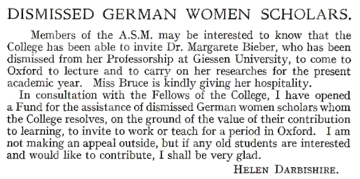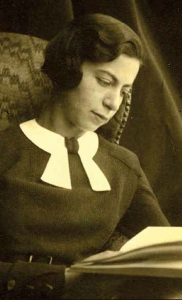In the 1930s, Somerville was one of several Oxford colleges to offer refuge to academics fleeing persecution in Germany under Adolf Hitler and the Nazi regime.
Following the launch of our Refugee Scholarship campaign, we take a look back at this piece from the 2017 Alumni Magazine by our Archivist Kate O’Donnell, telling the story of one refugee scholar from the 1930s and her lifelong connection to Somerville.
Within months of Hitler’s rise to power, scores of prominent Jewish professors had been dismissed from their posts.
In April 1933, the economist William Beveridge founded the Academic Assistance Council (AAC) and the following month the AAC made its first appeal to universities across Britain, asking them to help persecuted and exiled academics with offers of work and sponsorship.
Somerville’s Principal, Helen Darbishire, rose to the challenge and was particularly active in Oxford’s refugee projects. She established a fund for the assistance of dismissed German women scholars, appealing to the Association of Senior Members via that year’s annual report.
The Council minutes of October 1933 noted that the Principal and Fellows had already agreed to offer temporary appointments where possible and Frau Dr Margarete Bieber, the former Professor of Classical Archaeology at the University of Giessen, was one of the first to benefit. She was offered an Honorary Research Fellowship and hospitality for three terms. Dr Bieber was also engaged to give a course of lectures, funded jointly by the women’s colleges.

Then-Principal Helen Darbishire notifies alumnae of her decision to open a new fund
Over the following 12 years the College assisted other German scholars, including the Egyptologists Dr Kathe Bosse and Dr Elise Baumgartel, the Classicist Dr Herzog Hauser and the Hittite Scholar Miss Leonie Zuntz.
Somerville’s funds were limited and it deployed its financial resources as effectively as possible, offering meals or accommodation as well as research grants.
The Classicist Dr Lotte Labowsky had the longest and closest association with Somerville, eventually becoming a Fellow of the College.
Lotte Labowsky was born in Hamburg in 1905 into a distinguished Jewish family of lawyers. Her schoolfriends included the daughters of Aby Warburg, the art historian and cultural scholar.
Labowsky studied Classics and Philosophy at Munich and took her DPhil at Heidelberg in 1932; she then worked as a voluntary assistant at the Warburg Library.
She was prevented from sitting the state examination due to the anti-Jewish laws introduced in 1933, and sought a way to leave Germany.
In 1934, the Warburg Library moved to London, becoming the Warburg Institute, and she was invited by the Institute, at the recommendation of fellow scholar (and the Institute’s future Director) Gertrude Bing, to England to continue her research. By the end of 1934, she was in Oxford. Assisted by Gilbert Murray and his wife, Lady Mary, she was introduced to Somerville’s Classics tutor, Mildred Hartley, who became a close friend.
As a voluntary assistant at the Warburg Institute, Labowsky worked on the Corpus Platonicum Medii Aeviand Mediaeval and Renaissance Studies, supported by grants from the Society for the Protection of Science and Learning (SPSL, the successor to the Academic Assistance Council).
Her financial circumstances were precarious, and her family situation more so, with her parents still in Hamburg. They finally joined her in Oxford shortly before the outbreak of the war and a note in the College archives records that Labowsky managed to take her furniture out of Germany in readiness for their arrival.
In January 1939, Somerville’s Council held a special meeting to discuss assisting the refugee scholars further; the SPSL had to reduce its funding and the Council allocated a sum from the Research Reserve Fund to distribute as grants.
The Council also decided to provide board and lodging for one or two scholars, the aim being to assist those who would benefit most from being in Oxford.
In February 1939, Helen Darbishire wrote to Labowsky to offer her meals in the College as a guest of the Senior Common Room. Four months later, she was offered a research grant, establishing a formal connection with the College which would continue for another fifty-two years.
During the Second World War, the College and its Principal did what they could to support the refugee scholars. Helen Darbishire wrote testimonials to keep Labowsky from internment and she also wrote to the Under Secretary of State at the Home Office to appeal for the release of her father Norbert Labowsky, interned in June 1940.
Renewal of her grant and an honorarium for assisting in the Library helped Labowsky to continue her work on the Corpus Platonicum Medii Aevi, she being the sole scholar left working on that project by October 1941.
In 1943, she was appointed Acting Librarian at Somerville, a post she held until 1946, whereupon she became the Lady Carlisle Senior Research Fellow and later an Additional Fellow and Member of Governing Body. She was also a Senior Research Fellow at the Warburg Institute.
Labowsky’s association with Somerville lasted until her death in 1991. She remembered the College in her will with a number of generous bequests, including a collection of antiquarian books, a painting by the German expressionist Paula Modersohn-Becker, and funding for an English tutor, the Fellowship named in honour of Somerville’s late English tutor, Rosemary Woolf.
The archives also hold an intriguing collection of papers concerning a portrait of Heine, painted by Isidor Popper in Hamburg in 1843.
The artist’s descendant, Martin Popper, and his wife, gave the portrait to their relative, Mrs Labowsky, before she fled to Oxford. The Poppers were killed in Theresienstadt concentration camp.
In 1970, the painting was collected from Mrs Labowsky’s safe keeping and returned to Germany. It now hangs in the Heinrich-Heine-Institut in Dusseldorf.
Labowsky was one of many scholars who sought and found refuge in academia in Oxford and across Britain. The support offered by institutions and individuals, via sponsorship, paid employment and testimonials, was lifesaving. In return, the exiled academics brought with them the ethos of European scholarship, assimilated the culture and approach of their adopted country and contributed, professionally and personally, to intellectual, academic, and community life.
The Society for the Protection of Science and Learning continues its work and is now called the Council for At-Risk Academics (CARA).
The College recently launched a new Refugee Scholarship, which is supported by a crowdfunding campaign. If you would like to find out more, and consider donating to secure its future, visit the crowdfunding page.
